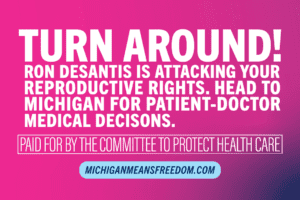Physicians group drags DeSantis with billboard warning Florida travelers of abortion bans
The Committee to Protect Health Care hopes its billboard will make people think about how Florida’s restrictive abortion law could impact their health care.

A national physician-led health care advocacy group is advising travelers to Florida who can become pregnant to think twice about visiting the state because of its restrictive six-week abortion ban, recently signed into law by Republican Gov. Ron DeSantis.
The Committee to Protect Health Care has paid for a billboard located outside of the Orlando International Airport that reads: “Turn around! Ron DeSantis is attacking your reproductive rights. Head to Michigan for patient-doctor medical decisions.” The blunt message from Dr. Timothy Johnson, an OB-GYN based in Ann Arbor, Michigan, directs people arriving at the airport to MichiganMeansFreedom.com, a site sponsored by the group.
In April, Democratic Michigan Gov. Gretchen Whitmer and the state’s Democratic-controlled Legislature repealed Act 328, an archaic 1931 abortion ban that criminalized nurses and doctors for providing abortions and offered no exceptions in cases of rape and incest. Michigan voters approved Proposition 3, a measure on the ballot in November that amended the state Constitution to protect reproductive rights in the state.
Johnson told the American Independent Foundation that he became involved with the Committee to Protect Health Care in response to the enactment of new laws that affect his practice:
Policies and laws are having an impact on how I practice medicine. And people are making rules and changing laws that are impeding the ability of my colleagues in other states to provide the kind of care they want to provide to their patients, and to talk to patients about their options. [Physicians] are working to change the policies, laws, in ways that protects patients and protects their health, and CTP has been an avenue for us to do this.
In April, DeSantis signed into law an extreme six-week abortion bill that, in addition to banning pregnant people from obtaining abortion care after six weeks of pregnancy, also requires that abortion medication be prescribed by a physician in person.
The law allocates $25 million “for the purpose of implementing s. 381.96, Florida Statutes” — that is, a section of Florida law that mandates that the state work with the Florida Pregnancy Care Network, Inc. which the law calls “the not-for-profit statewide alliance of pregnancy support organizations that provide pregnancy support and wellness services through a comprehensive system of care to women and their families” — also known as “crisis pregnancy centers.” The centers present themselves as reproductive health care clinics but specifically do not provide abortions and work to dissuade patients from obtaining abortion care.
The state’s six-week ban is on hold until the Florida Supreme Court rules on a challenge to the state’s existing 15-week abortion ban, which DeSantis signed into law last July.
“I’ve not done politics during my career, but what I’m interested in is making sure that patients can get evidence-based scientific health care. And with restrictions in Florida, that’s not going to happen,” Johnson said.
Johnson says that individual states should not have their own reproductive health laws and that a billboard like the committee’s shouldn’t even have to exist: “It suggests that Florida and Michigan are offering different medical care, and especially reproductive health care, to women. And for me, that’s an injustice.”
Florida is one of the 14 states in the nation with the most restrictive abortion laws in place.
“My hope is that the billboard will be an educational one. … [A] billboard makes a statement, right? People will look at it and say, What does this mean? And my hope is that my face and my voice will get people to think about that question, and delve into it and learn about what’s happening in their state, and what it means for their health care,” Johnson says.
Published with permission of The American Independent Foundation.
Recommended

Biden campaign launches new ad focused on Affordable Care Act
Former President Trump has said he wants to do away with the popular health care law.
By Kim Lyons, Pennsylvania Capital-Star - May 08, 2024
Ohio doctors fear effects of emergency abortion care case set to go before U.S. Supreme Court
A federal law that allows emergency departments to treat patients without regard to their ability to pay will be under U.S. Supreme Court scrutiny this week, and Ohio doctors are concerned about the case’s local impact on emergency abortion care.
By Susan Tebben, Ohio Capital Journal - April 23, 2024
House GOP votes to end flu, whooping cough vaccine rules for foster and adoptive families
A bill to eliminate flu and whooping cough vaccine requirements for adoptive and foster families caring for babies and medically fragile kids is heading to the governor’s desk.
By Anita Wadhwani, Tennessee Lookout - March 26, 2024









































































